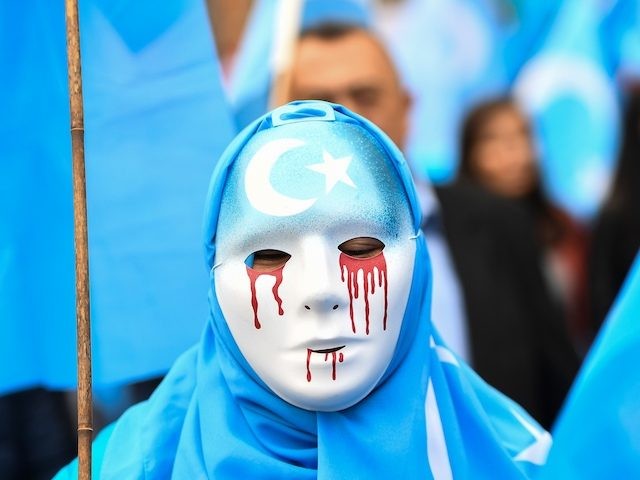China’s rubber-stamp legislature, the National People’s Congress (NPC), is considering a law that would formalize retaliation against other nations for sanctions against China for its human rights abuses, state-run media reported on Tuesday.
China’s state-run Xinhua news service portrayed the draft law as China striking back at dishonest critics who unfairly accuse it of atrocities.
“For some time … some Western countries have used Xinjiang and Hong Kong-related issues as part of their pretexts to spread rumors on and smear, contain and suppress China,” Xinhua argued, citing a “spokesperson office of the Legislative Affairs Commission of the NPC Standing Committee.” Xinjiang is the country’s westernmost region, home to the nation’s ethnic Uyghur minority. Multiple free states, including America, have declared China’s policy of concentration camp incarceration, forced sterilizations, torture, and slavery against the Uyghurs a genocide.
“In order to resolutely safeguard national sovereignty, dignity, and core interests and oppose Western hegemonism and power politics, the Chinese government has launched multiple corresponding countermeasures against entities and individuals of relevant countries since the beginning of 2021,” Xinhua reported.
Xinhua’s article was filled with Communist Party rhetoric about “people from all walks of life” in China supposedly demanding protection against unfair foreign sanctions and hard-working legislators rising to the challenge with “advice and suggestions on improving the draft,” but few details about what the law would actually do.
China’s state-run Global Times offered few additional details about the “anti-foreign sanctions law,” and repeated some of Xinhua’s story verbatim, but insisted the law was “widely hailed by Chinese legal experts as a necessary move to strengthen the country’s legal toolkit in the face of more blatant interference and crackdowns of the U.S.-led West against Chinese entities and individuals.”
Much of what the Chinese state is saying about the draft law boils down to posturing and snide insistences that America and Europe are treating China in a way they would never allow themselves to be treated.
“Legal experts said that speeding up legislation in foreign-related fields is necessary as it’s important to use legal measures to safeguard the legitimate rights of Chinese institutions, enterprises, and citizens,” the propaganda newspaper claimed. “Especially in recent years, the US government has been imposing sanctions on some Chinese entities such as high-tech firms Huawei and ZTE for so-called national security risks, and sanctioned a number of senior Chinese officials under the US’ so-called Xinjiang and Hong Kong bills last year.”
“We should learn from them in enhancing our legal tools,” one alleged Chinese “expert” told the Global Times. “Whether to use those tools or not remains unknown, but they have the deterrent effect.”
China is certainly no slouch in using economic power to achieve its malign geopolitical objectives. It has a habit of using its leverage over foreign corporations to make them obey Chinese speech codes and stifle their criticisms of Beijing’s abuses, as most recently evidenced by a Chinese pressure campaign to force the international garment industry to stop complaining about the use of slave labor in Xinjiang to harvest cotton.
Although Chinese state media accounts would lead the reader to believe retaliation for sanctions is something new for Beijing, a dire measure the Chinese Communist Party (CCP) is reluctantly considering because dishonest attacks from the West leave it no choice, China is actually no stranger to retaliatory sanctions.
Former White House trade negotiator Clete Willems told CNBC on Tuesday that China’s last foray into retaliation did not work out well for the communists, calling Beijing’s killing of a European Union investment deal to punish the EU for human rights sanctions a “huge strategic blunder.”
“It does show that with China, it’s overreaching and overreacting and not addressing legitimate issues like forced labor,” Willems said of China’s retaliatory actions. He praised the EU parliament for standing firm against China’s pushback, but encouraged the Europeans to push even harder for human rights reforms in China.
China also tried to retaliate against the United States in August for sanctions against China’s abuse of the Uyghur Muslims and its tyrannical behavior in Hong Kong, but those punitive measures were vague and their targets – including American legislators like Sens. Ted Cruz (R-TX) and Marco Rubio (R-FL) – seem untroubled by Beijing’s threats.
Some observers of the NPC’s theatrics speculated on Tuesday that China’s draft anti-sanctions law is meant to intimidate smaller nations that might be tempted to follow American and European leadership on human rights sanctions, essentially threatening them with swift and “automatic” reprisals if they criticize Chinese abuses or take any action perceived as embarrassing to the regime in Beijing.

COMMENTS
Please let us know if you're having issues with commenting.